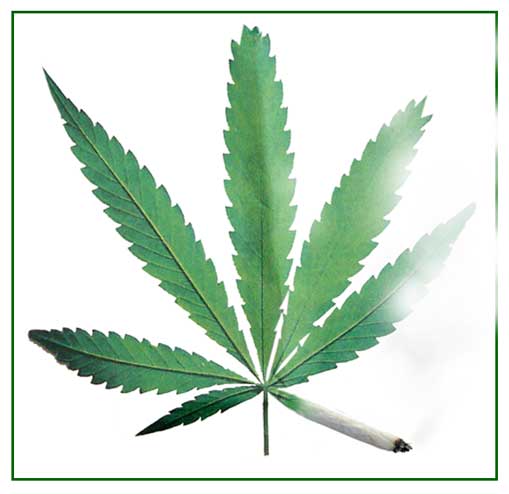

| What Should We Do About Medical Marijuana Sandra Adamson Fryhofer, MD / Medscape Internal Medicine / Posted: 01/15/2010 |
| Marijuana Poses MI Risk in Aging Users Cardiology Today. April 2000. Vol. 3, No.4 |
| Chronic Marijuana Users Suffer from Withdrawal The Medical Herald, December 2000 |
Marijuana Poses MI Risk
in Aging Users "To my knowledge, this is the first study to document that smoking marijuana can trigger an MI," said Murray Mittleman, MD, DrPH, director of cardiovascular epidemiology at Boston's Beth Israel-Deaconess Medical Center. "It increases the heart rate by about 40 beats per minute," he said. Marijuana "causes the blood pressure to increase when the person is lying down, and then abruptly fall when the person stands up, often causing dizziness. These effects may pose significant risk, especially in people with unrecognized coronary disease." Researchers collected detailed information on marijuana use in 3,882 patients who had suffered MI. Of these, 124 were identified as current marijuana users (more likely to be male, younger, smokers, normotensive, no diabetes or clinical coronary heart disease), including 37 who reported smoking the drug within 24 hours before their MI and nine who had used it within an hour of the onset of symptoms. 32% were women. Marijuana's psychoactive ingredient, tetrahydrocannabinols (THC), causes a hemodynamic effect with heart rate increases similar to complete vagal withdrawal. It is these abrupt changes that may trigger an MI. "We found that during the first hour of use, the risk of an MI is 4.8 times higher than during periods of non-use," said Mittleman. "In the second hour, the risk drops to 1.7 times higher than during periods of non-use. This indicates a rapid decline in the dangerous effects of marijuana on the heart, but the short-term risk is considerable, especially for patients with other risk factors.": Based on this study, the cardiac risks to individual users posed by marijuana appear to be much lower than associated with cocaine use, which causes much sharper rises in both heart rate and blood pressure, Mittleman said. The overall public threat from marijuana, however, could be even greater than from cocaine, as marijuana is more widely used. A recent report from the Institute of Medicine found no significant marijuana-related cardiac risk in younger users. "But the problem lies in the fact that now we have millions of baby boomers who are reaching the age when the risk of CHD (coronary heart disease) increases for both men and women," he said. "Many of these people were users of marijuana when they were in their teens and 20s, and a sizable percentage of them may still use the drug. They should at least be aware that their risk of an MI suddenly soars each time they smoke the drug." Researchers aren't sure whether it is the marijuana that imposes a risk of other components in the smoke or a combination of both. Mittleman said the issue warrants further study. Mittleman M. Lewis RA, Maclure M, et al. Triggering of MI by marijuana. #11. Presented at the American Heart Association's 40th Annual Conference on Cardiovascular Disease Epidemiology and Prevention. March 1-4, 2000. San Diego.
|
Chronic Marijuana Users Suffer from Withdrawal In the first out-of-laboratory study to examine what happens to chronic marijuana users when they stop using the drug while continuing their normal daily activities, McLean Hospital researchers have identified withdrawal symptoms that were significant in 60 percent of participants. In the November issue of Experimental and Clinical Psychopharmacology, the researchers report increases in irritability, anxiety and physical tension, as well as decreases in appetite and mood, among chronic users who abstained from marijuana during the four-week study. "Most people think marijuana is a benign drug, and there is disagreement in the scientific community about whether withdrawal causes significant symptoms. This study shows that using marijuana for a long time has consequences," says Elena M. Kouri, Ph.D., associate director of McLean's Behavioral Psychopharmacology and lead author of the paper. Previous research done at McLean and in other laboratories showed that marijuana could create dependence in users. Anecdotal case studies and evidence from studies done under laboratory conditions also indicated people suffered withdrawal symptoms when they stopped smoking marijuana. Marijuana is the most commonly used illegal drug in the United States. Fourteen percent of adolescent and seven percent of adult marijuana users are dependent on the drug. The McLean study included men and women between the ages of 30 and 55 who were recruited through newspaper advertisements and then interviewed at length. Thirty current users and 30 people who served as controls completed the 28-day study. Symptoms of withdrawal first appeared in chronic users within 24 hours. They were pronounced for the first 10 days of the study. Increases in irritability and physical tension were observed in chronic users for all 28 days of abstinence. The study raises a number of questions that can be answered only after further research. Since irritability and tension continued for 28 days, it may be that these symptoms reflect characteristics of study participants and were not really symptoms of withdrawal. The research also excluded people with psychiatric diagnoses, like depression, or who were currently taking other illicit drugs. Source: The Medical Herald, December 2000 |